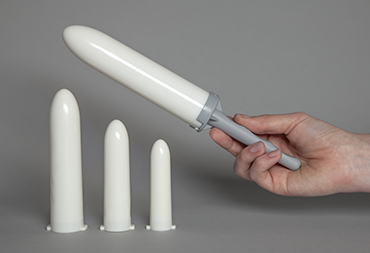Your sex life after vaginal cancer treatment
Vaginal cancer treatment can have an effect on your sex life and relationships. These treatments include surgery and radiotherapy.
For many women, this can start soon after treatment and can be permanent.
Having investigations and the emotions you feel with having vaginal cancer can also change the way you feel about your sex life. But there are ways to manage the problems that can cause these changes.
Talking about sex and how you feel
Your healthcare team will talk to you about the possible side effects of treatment. Including how it might affect your sex life.
You may feel embarrassed talking about this but try not to be. The health professionals looking after you are very experienced and are used to talking about sexual problems. Being prepared can help you cope with these conversations.
Do not be afraid to ask questions. They understand how worried you are and will want to help and reassure you.
Having sex after treatment
It’s difficult to know exactly how the side effects of treatment will affect your sex life. It depends on the type of treatment you have. You might:
- find sex uncomfortable or painful
- have different sensations during sex
- not get as much satisfaction from sex
- feel differently about the way you look
Your healthcare team can help you cope with any side effects or emotions you may have. They can also put you in touch with a specialist sex counsellor.
Other effects of treatment can include:
early menopause 
- fibrosis and narrowing of the vagina
- tiredness and fatigue
- delicate skin inside the vagina
- the need to pee more frequently or urgently
- no control over passing urine
- loose poo (diarrhoea)
Early menopause
You will have an early menopause if you have radiotherapy, or if you have both your ovaries removed. If you haven't had your menopause your surgeon might try to leave one ovary, but this is not always possible.
The symptoms of menopause due to cancer treatment are the same as those of a natural menopause. But they can be more intense if it comes on suddenly. You might have:
- hot flushes and sweating
- vaginal dryness
- low mood or depression
- loss of confidence and self esteem
- tiredness
- thinning bones
- loss of interest in sex
You might be able to take hormone replacement therapy (HRT) to help with these symptoms. HRT comes as tablets, skin patches, or implants that you change every few months. They give you the female sex hormones that your ovaries are no longer producing.
Sex after radiotherapy
After radiotherapy, you usually need to use dilators to stop your vagina from shrinking and narrowing. The dilators keep the vaginal opening stretchy so you can continue to have sex. It also allows doctors to examine you during follow up appointments without it being uncomfortable.
Your nurse will explain how and when you use them. Speak to them if you have any questions or problems, or if you don’t feel comfortable with using dilators for any reason.

Your healthcare team might prescribe or suggest gels and creams to moisturise the vagina and prevent soreness.
Other ways that may help to reduce pain include:
-
pelvic floor exercises (these strengthen the muscles in the pelvis)
-
relaxation
Remember that your specialist nurse can help you cope with any side effects you may have.
Sex after vaginal reconstruction
Vaginal reconstruction means creating a new or artificial vagina after you have had surgery to remove your vagina (vaginectomy). One of the aims of reconstruction is to try to make vaginal sex (intercourse) possible after surgery.
There are some possible problems with this surgery, these can include:
- a drop in sexual desire or pleasure
- changes in sensation during sex
- problems reaching orgasm
- numbness in your genital area
- a narrowing of the vaginal opening because of scar tissue
Your doctor or nurse can give you vaginal dilators to use.
You may have a small amount of bleeding or spotting after sex. This is nothing to worry about. But if the bleeding becomes heavy, then see your doctor.
Skin graft and sensation
If you have vaginal reconstruction using skin and muscle taken from your thigh, you might feel a strange sensation in your inner thighs when you have sexual intercourse. This is described as feeling as if your inner thighs are being stroked.
It happens because the nerves that supplied the thigh tissue, now form the walls of the reconstructed vagina. Your brain picks up this message and thinks that the leg is being touched. This can feel very strange and may be very off putting at first. Over time, most people get used to it and it can even become sexually stimulating.
Some people say they don’t feel they can contract the muscles around the entrance to the vagina as easily as before their surgery. You and your partner may need to experiment and try different sexual positions. With time and patience, you may be able to find some positions that you both enjoy.
Worrying about sex
It is understandable to feel nervous about having sex again after treatment, but try not to worry. You may need more time to come to terms with what has happened to you. If you feel worried, anxious or depressed, you probably won't want to have sex.
It can help to talk things over with your partner. Together you should be able to work out what is best for you both.
There are sex therapists you can see if you would like to. Talk to your GP or specialist nurse. They can put you in touch with a therapist.



